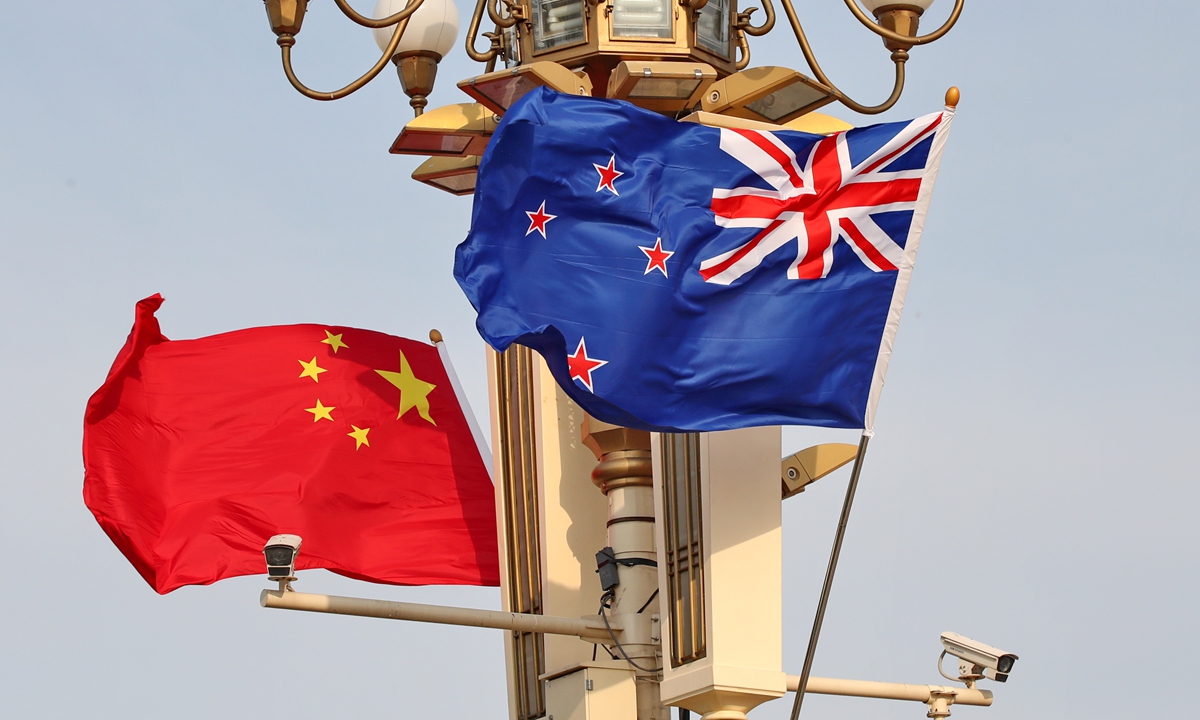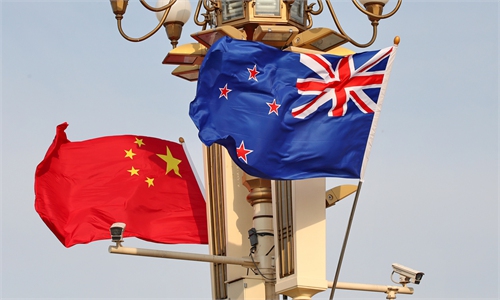China and New Zealand to further boost economic and trade ties, exploring more cooperation potential
Good example for Western countries to handle relations with China: experts

National flags of China and New Zealand on Tiananmen Square in Beijing on June 25, 2023 Photo: VCG
China and New Zealand will start negotiations on a negative list for service trade in 2023, while further strengthening trade, expanding cooperation in sectors including e-commerce, service trade and green economy, and maintaining communication on cooperation under the China-proposed Belt and Road Initiative (BRI), according to a joint statement on the comprehensive strategic partnership released by the two countries on Wednesday.
At the invitation of Chinese Premier Li Qiang, New Zealand Prime Minister Chris Hipkins is paying a state visit to China from Sunday to Friday.
The two sides reaffirmed the importance of the joint communiqué on the establishment of diplomatic relations in 1972 and the joint statement on establishing a comprehensive strategic partnership in 2014, agreeing to strengthen high-level contacts, enhance understanding and manage differences. New Zealand reaffirmed its adherence to the one-China principle.
In terms of the strengthened cooperation on economy and trade, the two sides welcomed the implementation of the upgrading protocol of the free trade agreement (FTA) in 2022, which further expanded and modernized the original agreement. Besides the above-mentioned proposals, the two countries will set up a dialogue mechanism on new-energy vehicles.
Experts noted that New Zealand has set a good example for Western countries on how to handle relations with China by establishing stable trade, economic and political ties with potential for more cooperation.
The remarkable outcomes show that the two sides have further expanded their economic and trade cooperation from traditional sectors like dairy products and wood to new sectors such as innovations and cultural exchanges, and from sound bilateral cooperation to multilateral cooperation, Sun Chang, a research assistant at the Institute of Southeast Asian and Oceanian Studies at the China Institutes of Contemporary International Relations, told the Global Times on Wednesday.
While some Western countries following the US in containing China, New Zealand continues to strengthen stable economic and trade cooperation with China. This underscores New Zealand's relatively independent foreign policy and priority of putting the interests of its own people first on China policies, Sun said.
"Different from many Western countries, New Zealand maintains a mature and stable bilateral relationship with China. They rise above differences and disagreements, and respect each other and seek mutual benefit and win-win results," she said.
The bilateral economic and trade cooperation remains the ballast stone for relationship and the joint statement is also a reiteration for the strategic partnership, especially as China-New Zealand relations move to the next level after the COVID-19 epidemic, Chen Hong, director of the New Zealand Studies Center at East China Normal University, told the Global Times on Wednesday.
Chen said that the strengthened collaboration in sectors such as the service trade represents a more elevated and updated economic and trade pattern on top of the exchanges on traditional sectors, as both China and New Zealand have been exploring new development potential and possibilities in more fields including NEVs and clean energy.
Hipkins said on Wednesday that New Zealand is very proud of its trade relationship with China, which has been largely boosted since the signing of the FTA in 2008, thepaper.cn reported. He added that New Zealand is expecting to further expand trade in more emerging sectors from digital technology to healthcare.
As for the to-be-negotiated negative list, Chen said that the focus was previously placed on fields such as education, healthcare and pension cooperation, with the expectation of more practical work to land with the progressing of the negative list.
Chen meanwhile highlighted the huge potential for cooperation under the BRI especially targeting the infrastructure construction as New Zealand has rich natural resources. The two countries signed a memorandum of understanding on strengthening the cooperation on the BRI in 2017, marking the first cooperation document that China signed with a South Pacific country under the BRI.
The two sides also welcomed the resumption of people-to-people exchanges since the reopening of the boarders, and agreed to strengthen cooperation in sectors including culture, sports, education, aviation and tourism, read the statement.
New Zealand and China approved new direct flight routes, aiming to further increase the number of Chinese tourists, according to media reports.
The statement emphasized the cooperation under the Regional Comprehensive Economic Partnership (RCEP), while stressing that the New Zealand welcomes China to join the Comprehensive and Progressive Agreement for Trans-Pacific Partnership and China's participation in the ongoing in-depth discussions in the working group of the Digital Economy Partnership Agreement.
Chen noted that the consolidated bilateral cooperation will also help boost multilateral cooperation especially under the RCEP and other regional frameworks on top of the thawing China-Australia relations despite some Western countries hyping about "decoupling" from China.
Sun added that both being South Pacific island nations, Australia is closely following Hipkins' visit to China, and the active exchanges between China and New Zealand may prompt Australia to further engage with China.


